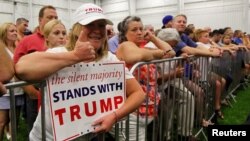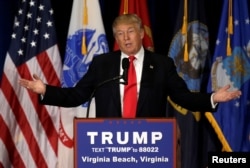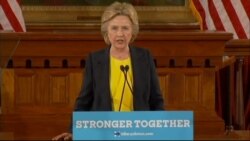New polling in key battleground U.S. states is showing Republican Donald Trump gaining ground on Democrat Hillary Clinton, four months before November's presidential election.
Quinnipiac University said Wednesday its recent surveys showed Trump, a billionaire real estate mogul seeking his first elected office, with a 42 to 39 percent lead in the southeastern state of Florida, reversing an eight-point Clinton edge from three weeks ago.
The pollster said Trump has pulled to a 43 percent to 41 percent edge in the eastern state of Pennsylvania, where Clinton, a former U.S. secretary of state, had previously been up by one point. The two candidates remain tied in a third state, Ohio, in the Midwest.
As Trump heads to the Republican national convention next week in Cleveland, Ohio, to officially claim his party's presidential nomination, Quinnipiac pollster Peter Brown says the candidate is "on a small roll in the three most important swing states in the country."
Some of the polling was conducted in the days after the U.S. Federal Bureau of Investigation concluded last week that Clinton was "extremely careless" in the way she handled classified information on her private email server while she was the country's top diplomat from 2009 to 2013, but that she would not be charged with criminal violations.
Nationally, an average of various polls shows Clinton, seeking to become the first female president in the U.S., with about a four-point advantage over Trump.
Electoral edge
U.S. presidential elections, however, are not decided by a national popular vote, but rather contests in each of the 50 states and the national capital, Washington, with each area's influence on the outcome contingent on its population and the number of senators and representatives it has in Congress.
U.S. election analysts say Clinton has an early prospective edge in the electoral college, where a majority of 270 of the 538 electors is needed to win the presidency.
But the three states where Quinnipiac polled are among the most closely contested in the quadrennial U.S. presidential elections, all states won by the country's Democratic president, Barack Obama, in both 2008 and 2012. Whoever wins at least two of the three this year is likely to be Obama's successor when he leaves office in January.
VP announcements
Trump spent Wednesday considering his choice for a vice presidential running mate, having breakfast with Indiana Governor Mike Pence, meeting with former House Speaker Newt Gingrich and talking on the phone with New Jersey Governor Chris Christie. Trump is expected to announce his choice Friday, three days ahead of the start of the Republican national convention.
Clinton, who is expected to name her vice presidential pick next week, days ahead of the Democratic national convention, criticized Trump as a polarizing figure who is deepening racial divisions in U.S.
"Donald Trump's campaign adds up to an ugly, dangerous message to America," she told a campaign rally in Springfield, Illinois.
WATCH: Clinton says GOP becoming Party of Trump







